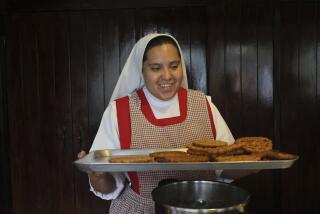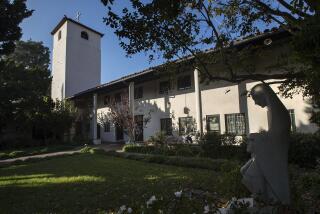Iowa abbey provides lodging and solace
- Share via
PEOSTA, Iowa — --Amid the gently contoured hills of eastern Iowa, only a few miles from the Mississippi River, New Melleray provides guests with an idyllic setting in which to escape the hustle and bustle of urban living. From their hilltop rooms, visitors can look out onto forests and farmland that stretch as far as the eye can see, a beautiful sight in any season. After an afternoon hike along one of the wooded trails, guests are treated to a hearty all-you-can-eat dinner.
Upon leaving the dining room, most people head to their rooms for some quiet time. There are no televisions, hence no game-show contestants shouting, “C’mon, big money!” In fact, the only sounds may be the chirping of crickets or the rustle of the breeze blowing through the trees. The gentle sounds help visitors to forget their troubles. But, before dozing off, it’s a good idea to set the alarm. Otherwise, it’s easy to sleep right through the first activity of the next day. At 3:30 a.m.
That is not when a personal trainer begins a pre-dawn workout session. Or when a spa opens for a pre-breakfast mud bath. It is when the monks begin their Gregorian chants in the dimly lit, 19th Century chapel that adjoins the guesthouse. New Melleray isn’t a resort, it’s an abbey that is home to 32 Trappist monks of the Cistercian order.
Members of the Cistercian order generally are committed to manual labor such as field work. And, despite their monastic vows, these men are gracious hosts.
“It’s interesting because it’s a paradox. We believe in solitude and silence, in not being too immersed with what goes on outside,” explained Rev. Tom MacMaster, the abbey’s guest master. “On the other hand, Cistercians have always been very hospitable. It’s trying to put them both together. You have to love yourself and your neighbor and keep them in balance.”
A room with private bath and three simple but tasty meals costs a modest $50 per person. But, MacMaster cautioned, New Melleray Abbey isn’t a hotel or a base for seeing the sights in Dubuque, 13 miles northeast. It is a retreat, a place for contemplation and meditation.
“When we first started going, I remember my son asked, ‘Do they have a pool or a Jacuzzi or anything like that?’ ” David Karakatsoulis of Duluth said with a chuckle. For the last eight years, he and wife Anne have made the seven-hour drive to the monastery when they felt a need for prayer and reflection.
“A common expression you’ll hear is that they feel like they’ve come home,” Karakatsoulis said of fellow guests. “I’ve experienced that, and I’ve heard other people say the very same thing. I think it is definitely a place of pilgrimage for some people.”
“They don’t have any tensions here,” MacMaster explained. “They get peace here that they can’t find elsewhere.”
Regardless of religious beliefs, visitors are encouraged to participate in the spiritual life of the community by attending at least some of the seven daily prayer services, known as offices. The first of these begins daily at 3:30 in the morning.
“We rise in the middle of the night because this is the time of day--or night--when much evil takes place,” explained Rev. Stephen Verbest, who has been a member of the order for more than 50 years. “We pray and intercede for the world against the suffering and the evils and the tragedies that are happening.”
The faithful guests--and the seekers too--begin arriving shortly after 3. The pews are in darkness as the bells chime at 3:25, calling the monks to the chapel.
Dressed in their simple black-and-white habits, the brothers and fathers enter, their sandals shuffling across the floor the only sound. Then they begin their chants, reciting Psalms in a haunting cadence that echoes off the old stone walls.
“I think it’s probably one of those intangibles,” Karakatsoulis said of the ancient ritual. “It’s kind of hard to describe.”
People are free to spend their days as they choose. But, as the abbey’s welcome booklet explains, guests are urged to “help maintain an environment of silence” by refraining from talking in their rooms.
Laptops, MP3 players and the like can be used only with earphones. And forget cell phones.
Guests may want to make the five-minute walk up the road to the abbey’s main source of income, its coffin factory. Trappist Caskets boasts a brand-new visitor center and showroom that displays the various products: from a simple pine casket ($975) to an elegant model made of walnut ($2,650). Some customers choose to avoid inflation by purchasing a “pre-need” casket. “You pay now, and the casket is delivered when it is needed,” a brochure explains.
Six days a week, some of the brothers swap habits and sandals for blue jeans, denim shirts and work boots to toil side by side with lay people in the factory. All but the infirm monks have regular work assignments either at the factory or with the monastery.
Rev. Stephen Verbest, for example, serves as the vocations director and also is the resident electrician. Verbest, the son of a brewery president from Milwaukee, entered the monastery when he was just 19. He’s now 72.
“I never have to worry about being fired,” he said of his work at the abbey. He noted that though there is no paycheck, his food, shelter, clothing and medical care are all paid for. And, Verbest said with a smile, “The retirement benefits are out of this world.
“If people really understood this life, they would flock to it,” he continued, ignoring the pun. “People are seeking happiness. Here they have peace in their heart. They have a good conscience. What could be more beautiful?”
The abbey was started in 1849 by monks fleeing the potato famine in their native Ireland. The brothers built the edifice themselves from limestone they quarried from their new land.
“I try to imagine all of the different hands that were responsible for bringing the stones out of the quarry and then laying them one by one,” remarked Karakatsoulis, the frequent visitor from Minnesota. “There’s that general experience of all those monks over the years, building that community slowly, little by little, stone by stone.”
The $50 daily rate for a visitor’s room and board--it was recently increased from $40 due to rising expenses--is, in fact, a freewill offering.
“We do appreciate when people give us enough so we can pay our bills,” said MacMaster, the guest master. “On the other hand, when there’s someone in crisis, we tell them it’s important to make the retreat and that money is secondary.
“I would like to see people come and not be pressured by money,” he added.
That said, few abuse the privilege of staying in a monastery. Some, in fact, choose to donate more than the asked-for $50 a night when it comes time to leave. Parting, for some, isn’t easy, MacMaster added.
“Many times we have to encourage them to go,” he explained. “They say they’d rather stay here than go back.”
Alas, there are jobs to return to, mortgages and credit card bills to pay. But, having spent some time among these peaceful people in their serene surroundings, maybe the outsiders can return to their disquieted world refreshed and inspired. That’s the least any of us can hope or, as the case may be, pray for.
More to Read
Sign up for The Wild
We’ll help you find the best places to hike, bike and run, as well as the perfect silent spots for meditation and yoga.
You may occasionally receive promotional content from the Los Angeles Times.






